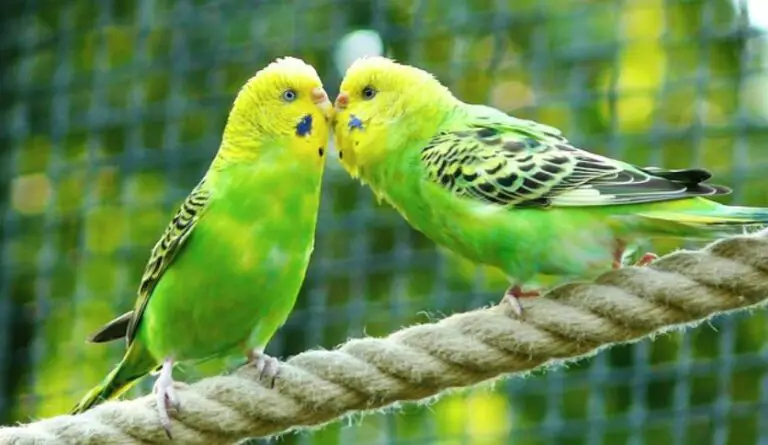Parakeets’ vibrant colors and lively personalities have charmed their way into many homes and hearts. But have you ever wondered about their relationship with music? This article delves into the intriguing world of parakeets and their musical preferences, offering insights from first-hand experiences and expert knowledge.
What is the Concept of Music with Parakeets?
We must first consider their natural environment to understand how parakeets perceive music. In the wild, these birds are surrounded by a symphony of sounds, from rustling leaves to the calls of other birds. Music, in a sense, is a part of their natural language. Parakeets have a keen sense of hearing and can differentiate between sounds and rhythms.
Why Music Matters to Parakeets
Music can play a significant role in the emotional well-being of a parakeet. Like humans, these birds can exhibit happiness or excitement when they hear certain tunes. I’ve observed my parakeet, Kiwi, bobbing his head and chirping along to classical melodies, a clear sign of his enjoyment.
How Parakeets Interact with Music
Parakeets often react to music by vocalizing or moving along with the beat. Some may even try to mimic the rhythms or melodies they hear. It’s a delightful sight to see a parakeet swaying or tapping its feet to the rhythm of a song, showcasing their natural rhythm and personality.
The Importance of Music in a Parakeet’s Life

Imagine living in a world of silence, with no sounds to break the monotony of your day. Now, think about how a simple melody can lift your spirits. This is what music can do for parakeets, our feathery friends who bring so much joy into our lives.
A Symphony for Solitude
Parakeets, like many birds, are social creatures. In the wild, they’re used to a constant backdrop of sounds – from the chatter of their flock to the rustle of leaves. However, they often spend hours alone in our homes, especially when we’re out for work or errands. This is where music steps in as a game-changer.
More Than Just Background Noise
Playing music for your parakeet isn’t just about filling the silence. It’s about creating an environment that stimulates their senses and minds. When a parakeet hears music, it’s like a window opening to a world full of different sounds and rhythms. This stimulation is crucial for their mental health, especially for birds that don’t have a feathered companion.
The Magic of Melody
Soft, soothing tunes work wonders for these little birds. Just like a lullaby can calm a baby, gentle music can create a peaceful and calming atmosphere for parakeets. It’s common to see a parakeet calm down and relax when a soft melody plays in the background. Some might even nod or flutter their wings gently, showing enjoyment.
Combatting Loneliness and Boredom
Loneliness and boredom can be real problems for parakeets, leading to stress and even behavioral issues. Music can help alleviate these feelings by providing a sense of companionship. For instance, the sound of a human voice in a song can make them feel like they’re not alone. It’s a simple yet effective way to enrich their environment and keep their spirits high.
Choosing the Right Tunes
While most parakeets enjoy music, it’s important to remember that each bird is unique. Some might prefer classical music, while others lean towards softer pop melodies. Observing your parakeet’s reaction to different genres is key. If they seem agitated or stressed, it’s time to switch to a different type of music.
Practical Use Cases: Introducing Music to Your Parakeet
Introducing music to your parakeet isn’t just about hitting the play button on your favorite playlist; it’s a journey of discovery for both you and your feathered friend. Here’s a simple, step-by-step guide to making music a part of your parakeet’s life:
Step 1: Choose the Right Music
Start with soft, melodic tunes. Think of gentle classical pieces or even slow, rhythmic songs. The idea is to create a soothing environment, not a rock concert. Remember, what sounds good to us might be overwhelming for their sensitive ears.
Step 2: Observe Your Parakeet’s Reaction
This step is crucial. As the music plays, watch your parakeet closely. Does it seem curious, excited, or perhaps indifferent? Some birds might start to chirp along or bob their heads, a sign they’re enjoying the beat. On the other hand, if your parakeet retreats to a corner or looks agitated, that’s your cue to try something different.
Step 3: Experiment with Different Genres
Not all parakeets have the same taste in music. While the soothing sounds of Mozart might enter one, another might perk up at the sound of jazz or pop music. The key is variety. Switch things up and note which genre gets the most positive response.
Step 4: Create a Routine
Once you’ve figured out your parakeet’s favorite tunes, incorporate music into its daily routine. Maybe play some melodies during their morning feed or in the evening as they wind down. This routine can help your parakeet associate music with positive experiences.
Step 5: Keep the Volume in Check
Parakeets have delicate hearing, so it’s important to keep the volume low. The music should be a background element, not a dominating force. Think of it as the soundtrack to their day, not the main event.
Step 6: Watch for Overstimulation
Just like us, parakeets can get overstimulated. If you notice your bird getting too excited or stressed, it might be time to give it a break from the music. Balance is key to ensuring a happy, healthy environment.
Step 7: Enjoy the Bonding Experience
Music isn’t just for your parakeet’s entertainment; it’s a bonding opportunity. Sing along, dance a little, or sit with your bird and enjoy the tunes together. This shared experience can strengthen your bond and make for some truly special moments.
Solving Common Issues with Music for Parakeets
When introducing music to your parakeet, it’s essential to remember that each bird is an individual with its likes and dislikes. Like people, not every parakeet will instantly take a liking to music. If you notice that your feathered friend seems uneasy or frightened when you play music, don’t worry – there are simple steps you can take to make the experience more enjoyable for them.
Lower the Volume
Sometimes, the issue might be as straightforward as the volume of the music. Parakeets have sensitive ears, so what seems like a reasonable volume to us might be overwhelming. If your bird appears stressed, try turning the music down softer. A gentle background sound can be more comforting than a loud melody.
Experiment with Different Genres
Just like humans, parakeets have diverse tastes in music. If your bird doesn’t enjoy one type of music, try switching to a different genre. Some birds might prefer the soothing sounds of classical music, while others might find joy in the rhythmic beats of jazz or the gentle strumming of acoustic guitar. Pay attention to your bird’s behavior with each type of music – a happy parakeet might chirp along, flap its wings, or bob its head.
Create a Calming Environment
The environment in which you play music for your parakeet also matters. Ensure the room is comfortable and free from sudden, loud noises that could startle your bird. Creating a calm and safe space can help your parakeet relax and possibly enjoy the music more.
Gradual Introduction
A gradual introduction might be necessary if your parakeet is new to the music world. Start by playing music for short periods and gradually increase the time as your bird gets used to it. This slow approach can help prevent any initial discomfort or fear associated with the new experience.
Observe and Adjust
The most important thing is to observe your parakeet’s reaction and adjust accordingly. Look for signs of enjoyment, like playful movements or attentive listening, and signs of distress, like cowering or screeching. Your bird’s behavior best indicates whether the music is a hit or a miss.
Patience is Key
Remember, patience is vital when introducing your parakeet to something new, like music. It might take some time for your bird to get used to the idea of music being a part of its environment. You can find the perfect musical match for your feathered companion with patience and careful observation.
Frequently Asked Questions (FAQs) about Parakeets and Music
Do parakeets actually like music?
Yes, many parakeets enjoy music. They can show signs of pleasure, such as chirping, dancing, or bobbing their heads in response to certain types of music.
What kind of music do parakeets prefer?
Parakeet musical preferences can vary. Some may enjoy classical music for its soothing melodies, while others might prefer the upbeat rhythms of pop or jazz. It’s best to try different genres and observe your bird’s reaction.
Can loud music harm parakeets?
Yes, loud music can be harmful to parakeets. They have sensitive hearing, so it’s important to keep the volume moderate to avoid causing them stress or discomfort.
How can I tell if my parakeet likes the music?
You can tell if your parakeet likes the music if it shows positive behaviors such as chirping happily, dancing, or interacting with its surroundings. Conversely, signs of distress or fear might indicate that the music is not enjoyable for your bird.
Is it okay to play music for my parakeet all day?
Playing music all day is not advisable as parakeets also need quiet time. Just like humans, they can become overstimulated. It’s best to limit music sessions to a few hours a day.
How do I introduce my parakeet to music?
Start by playing music at a low volume for short periods. Gradually increase the duration as your parakeet gets accustomed to it. Observe your bird’s reaction to different types of music and adjust accordingly.
Will my parakeet sing along with the music?
Some parakeets may sing along or mimic the rhythms and melodies of the music, while others might listen and enjoy. Each bird is unique in how it interacts with music.
Can playing music improve my bond with my parakeet?
Yes, sharing a musical experience can strengthen your bond with your parakeet. Singing or humming along with the music can also enhance this bonding experience.
Conclusion
In conclusion, whether parakeets like music can be met with a resounding yes, though with a note of individual preference. Like us, these charming birds have their tastes and responses to different types of music. While some may sway joyfully to classical tunes, others might perk up at the sound of something more upbeat. The key is to observe and understand your feathered friend’s reactions, adjusting the music to suit their liking. Remember, the goal is to enrich their environment and strengthen your bond with them through these musical experiences. So, go ahead and experiment with various genres at a comfortable volume, and you might find that perfect soundtrack that makes you and your parakeet chirp with happiness.

Hi, I’m Regina Rios. Just another bird lover who loves to share knowledge from personal experience. I’ve grown up with pet birds since childhood as my mommy also loves birds. As I can’t pet many birds in open air in my house as my mom does; I created my first bird cage on my rooftop using wood, copper wire, and a metal shed in 2018 and start collecting pet birds. Now, I have so many pet birds such as Macaws, Parrot, Cockatiel, Parakeet, and others. Not only that, if I see natural birds are injured I keep them in my house until they get well. Now, my hobby becomes my income source as my home birds have babies and I sell them to birds lover like mine. I’ve created this blog to inspire others bird owners by sharing my personal knowledge. Good Luck!


